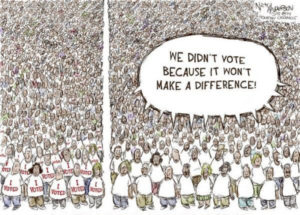
Q: I had a boss who asked me to bend the truth. I refused and eventually quit. How the heck can Sean Spicer say the things he says at the White House briefings? I don’t get it.
A: Kudos to you for leaving a situation instead of compromising your integrity. My mother often warned me that one lie begets another. In other words, once you tell a lie, you will have to fabricate another to cover the first. Not only is it is a slippery downhill slope, but the lies will come back and bite you in the butt.
The really bad news is that lying can be contagious and infect the culture of an organization, indeed a government or a country. Noted author and columnist Tom Friedman provides an important example of how lying can taint leadership:
I had several young Arabs from around the region tell me that when America lets its own leader get away with lying, hiding information and smearing the press or a political opponent, it is taken as a license by all Middle Eastern leaders, or the leaders of Turkey or Russia, to do the exact same thing and say: “See, the American president does it, why shouldn’t we?”
And he provides further proof:
the percentage of Germans who think the U.S. is a “trustworthy ally” dropped from 59 percent in November to 22 percent last month.
Uber’s current situation is a good example of how lying and deceptive practices play out in business. After they developed “Greyball” and deployed it against their competitors, Uber used it to create an electronic geofence to evade law enforcement. And here is how  deception became an underpinning and destructive element of Uber’s culture:
deception became an underpinning and destructive element of Uber’s culture:
At least 50 people inside Uber knew about Greyball, and some had qualms about whether it was ethical or legal. Greyball was approved by Uber’s legal team, led by Salle Yoo, the company’s general counsel.
The leaders of Uber often acted outside the bounds as evidenced not only by the practice of “greyballing” but also by the allegations of sexual harassment that characterized their “anything goes” culture.
Members of the group, called the A-Team and composed of executives who were personally close to Mr. Kalanick, were shielded from much accountability over their
actions.
So, again your decision to leave your job instead of “bending the truth” is probably serving you well now and will continue to do so into the future. And, you are in really good company: Jeff Jones stepped down as Uber’s President, citing these reasons:
“It is now clear, however, that the beliefs and approach to leadership that have guided my career are inconsistent with what I saw and experienced at Uber, and I can no longer continue as president of the ride sharing business.”
Finally, don’t fall into the trap of thinking that there is no such thing as “the truth.” Check your moral compass and basic beliefs and you may discover that you do not have a “grey” area when it comes to lying. How do you answer the following yes or no questions? 
- Am I a liar? Yes/no?
- Will I tell a lie to keep my job? Yes/no?
- Is it OK for my colleagues to lie? Yes/no?
- Have I asked someone to lie? Yes/no?
- Will I ignore the lies that my manager, colleagues or organization perpetuate? Yes/no?
- Would I lie for my boss? Yes/no?
 Having access and using access may be miles apart, and if you don’t take advantage of your access it does you no good. You may have access to a host of people, but are you taking advantage of that access? Why not? The answers I often hear are:
Having access and using access may be miles apart, and if you don’t take advantage of your access it does you no good. You may have access to a host of people, but are you taking advantage of that access? Why not? The answers I often hear are: friends with colleagues but not leveraging the air cover the general manager could provide to accelerate the implementation of statistical quality control. When I finally reached out, I discovered that my general manager had resorted to (and now relied on) feedback from others.
friends with colleagues but not leveraging the air cover the general manager could provide to accelerate the implementation of statistical quality control. When I finally reached out, I discovered that my general manager had resorted to (and now relied on) feedback from others.
 deception became an underpinning and destructive element of Uber’s culture:
deception became an underpinning and destructive element of Uber’s culture:
 Today, unprecedented situations are coming at us at firehose speed: change is necessary but no longer sufficient to stay on your feet.
Today, unprecedented situations are coming at us at firehose speed: change is necessary but no longer sufficient to stay on your feet.

 Q: I feel guilty. I didn’t vote. I didn’t think my vote would make a difference. Now when my friends debate I keep quiet and they are starting to notice. What can I do?
Q: I feel guilty. I didn’t vote. I didn’t think my vote would make a difference. Now when my friends debate I keep quiet and they are starting to notice. What can I do? out, focus on being present and engaged now by asking:
out, focus on being present and engaged now by asking: almost always know the reason for your silence. Make your life easier and speak up.
almost always know the reason for your silence. Make your life easier and speak up. If you are in a place where you don’t have friends, I hope that you are looking for a new job because you are in a toxic, stressful environment. Bottom line, you wouldn’t be reading this chapter if you had no friends at work! A more relevant question is, “What is a real friend at work?” The answer can be found in Chapter 3. Your colleagues offer you remarkable breadth and depth of experience. Individually, they are your “go-to people” for organizational information and know-how.
If you are in a place where you don’t have friends, I hope that you are looking for a new job because you are in a toxic, stressful environment. Bottom line, you wouldn’t be reading this chapter if you had no friends at work! A more relevant question is, “What is a real friend at work?” The answer can be found in Chapter 3. Your colleagues offer you remarkable breadth and depth of experience. Individually, they are your “go-to people” for organizational information and know-how.
 Q: I can’t tear myself away from the constant stream of news alerts. Frankly, it’s throwing me off my game. How do I cope?
Q: I can’t tear myself away from the constant stream of news alerts. Frankly, it’s throwing me off my game. How do I cope?
 When you are ready to take your organization to the next level, begin by asking two kinds of questions. “What” questions help to clarify the vision and mission; “how” questions elicit processes, actions, and/or solutions. Note the difference between: “What is next?” and “How can we reach the next step?” Know which questions to ask to move the process along to the next step in its growth.
When you are ready to take your organization to the next level, begin by asking two kinds of questions. “What” questions help to clarify the vision and mission; “how” questions elicit processes, actions, and/or solutions. Note the difference between: “What is next?” and “How can we reach the next step?” Know which questions to ask to move the process along to the next step in its growth. the answers. Asking a provocative question inspires people to think, to find new solutions and blaze new trails. To succeed, step back from your day-to-day, reflect and list the questions that if they are addressed (no: when they are addressed) will open onto new terrain—products, processes, and clients—for your organization.
the answers. Asking a provocative question inspires people to think, to find new solutions and blaze new trails. To succeed, step back from your day-to-day, reflect and list the questions that if they are addressed (no: when they are addressed) will open onto new terrain—products, processes, and clients—for your organization.
 a minute remaining in the game.
a minute remaining in the game.
 What is the quality that makes you feel like the “only one”? Common answers include race,
What is the quality that makes you feel like the “only one”? Common answers include race,
 e mistake of holding fast to the ideal of the meritocracy. In a competitive field in which everyone is competent, characteristics such as organizational savvy and “fit” come to the fore. If you cling to expectations of a strict meritocracy, you will be disappointed.
e mistake of holding fast to the ideal of the meritocracy. In a competitive field in which everyone is competent, characteristics such as organizational savvy and “fit” come to the fore. If you cling to expectations of a strict meritocracy, you will be disappointed. A: I just started my new job two weeks ago and I am a director reporting to another director, not to the VP as I was promised. What can I do?
A: I just started my new job two weeks ago and I am a director reporting to another director, not to the VP as I was promised. What can I do? the role and the reporting relationship, so excel in everything you do and develop a wide circle of senior level supporters who know you and appreciate your work.
the role and the reporting relationship, so excel in everything you do and develop a wide circle of senior level supporters who know you and appreciate your work.